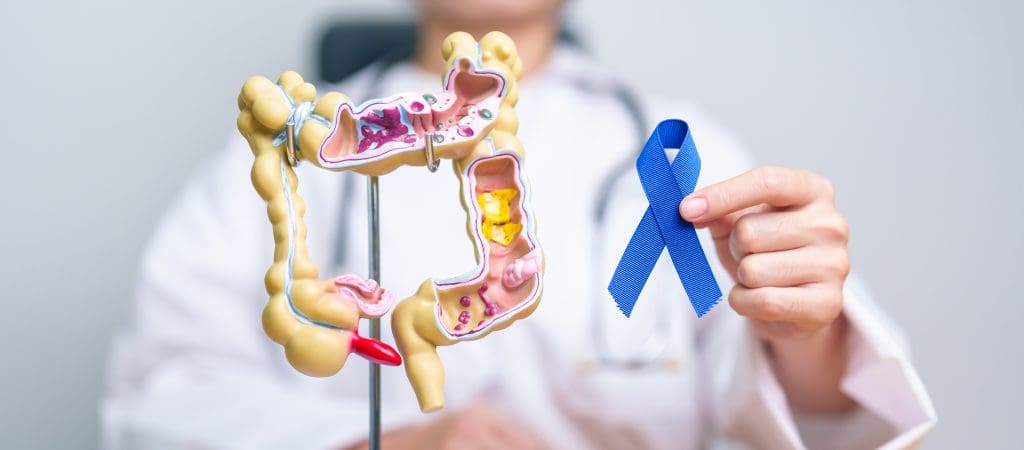A diagnosis of colon cancer can be scary. But, many people are successfully managing it and living long lives. Thanks to new medical treatments and a better understanding of the disease, colon cancer survival rates have greatly improved.
To live a long life with colon cancer, effective colon cancer management is key. This includes the latest treatments and making lifestyle changes. Knowing what affects life expectancy colon cancer patients helps make better care choices.
Key Takeaways
- Advances in medical treatments improve colon cancer survival rates.
- Effective colon cancer management is vital for long-term survival.
- Lifestyle changes can greatly impact life expectancy in colon cancer patients.
- Understanding what affects colon cancer survival is essential for making informed care decisions.
- Many people are successfully managing colon cancer and living long lives.

The Reality of Colon Cancer Today
Colon cancer is a common cancer in the U.S. It has many sides, like causes, how common it is, and survival rates. Knowing these things is key for patients, doctors, and researchers.
What is colon cancer and how does it develop?
Colon cancer, also known as colorectal cancer, happens in the colon or rectum. It often starts as a polyp, which can grow into cancer. Many things, like genes, environment, and lifestyle, play a role in its development.
Risk factors include age, family history, certain genes, and lifestyle choices. Screening early can help find and remove polyps before they turn cancerous.
Current prevalence and impact in the United States
Colon cancer is a top cancer in the U.S. Its high numbers show why we need to spread the word and screen more. In 2020, over 140,000 new cases were expected, showing its big impact.
Colon cancer affects not just patients but their families too. Thanks to better treatments, survival rates have gone up. But, it’s a major cause of cancer deaths.
The changing landscape of colon cancer survival
Thanks to early detection and better treatments, colon cancer survival statistics have gotten better. New surgeries, drugs, and therapies have helped patients live longer. The five-year survival rate has also gone up, showing progress in medical care.
But, there are gaps in healthcare that affect survival. Age, ethnicity, and money can change how likely someone is to get colon cancer and live longer.
Colon Cancer Survival Statistics: What the Numbers Tell Us
The latest stats on colon cancer survival give us important insights. They help patients, families, and doctors make better choices about treatment and care.
Overall Survival Rates and Trends
Colon cancer survival rates have gone up a lot in recent years. This is thanks to better treatments and early detection. The five-year survival rate for colon cancer patients has seen a big jump.
Key Statistics:
- Overall five-year survival rate for colon cancer: 65%
- Survival rate when diagnosed at an early stage: 90%
- Survival rate when diagnosed at a late stage: 14%
These numbers show how key early detection is. They also highlight how the stage at diagnosis affects survival.
How Age, Gender, and Ethnicity Affect Outcomes
Age, gender, and ethnicity are big factors in colon cancer survival. Younger patients usually do better than older ones. There are also survival rate differences among different ethnic groups.
| Demographic Factor | Five-Year Survival Rate |
| Patients under 50 | 70% |
| Patients 50 and older | 60% |
| Non-Hispanic Whites | 65% |
| African Americans | 58% |
| Hispanics | 62% |
The Impact of Healthcare Access on Survival
Getting good healthcare is key to surviving colon cancer. Patients with good insurance and access to specialists usually do better. But, not everyone has the same access to care, leading to survival rate gaps.
It’s vital for patients to talk with their doctors. They can understand their own survival chances and plan a treatment that fits them.
Stage1 Colon Cancer Survival: The Most Promising Outlook
Stage 1 colon cancer survival rates are encouraging, giving patients hope. Early diagnosis means higher chances of successful treatment.
Five-Year Survival Rates and Beyond
The five-year survival rate is a key indicator of treatment success. For stage 1 colon cancer, this rate is very high. Recent data shows a five-year relative survival rate of about 92%.
Survival rates beyond five years are also promising. With proper treatment and care, many patients live long, normal lives. They can enjoy a good quality of life.
| Stage | Five-Year Relative Survival Rate |
| Stage 1 | 92% |
| Comparison Group | 100% (general population) |
Standard Treatment Approaches
Treatment for stage 1 colon cancer usually involves surgery. The goal is to remove the tumor and some surrounding colon. Sometimes, chemotherapy is recommended, but it’s less common for stage 1.
Surgical options may include minimally invasive procedures. These can lead to quicker recovery and less discomfort. Treatment choices depend on the patient’s health, tumor characteristics, and other factors.
Long-Term Monitoring and Follow-Up Care
After treatment, long-term monitoring is key to catch any recurrence early. This includes regular check-ups, imaging tests, and possibly colonoscopies.
Follow-up care is tailored to the individual’s risk factors and health. Staying vigilant and following the recommended schedule can improve long-term survival and quality of life.
We know a colon cancer diagnosis can be overwhelming. But with stage 1 colon cancer, the outlook is generally positive. Effective treatment and long-term follow-up care can lead to a promising future.
Stage2 Colon Cancer Survival: Navigating Intermediate Disease
Stage 2 colon cancer is an in-between stage. It’s critical to get the right treatment quickly to improve chances of survival. At this point, the cancer has grown into the tissues around the colon but hasn’t spread to lymph nodes yet.
Understanding Stage 2 Survival Statistics
Survival rates for stage 2 colon cancer are good, with a 5-year survival rate of 70% to 90%. But, these numbers can change based on several things. These include the cancer’s type, the patient’s health, and how well the treatment works.
Key factors influencing stage 2 colon cancer survival include:
- Tumor grade and histology
- Presence of lymphovascular invasion
- Number of lymph nodes examined
- Patient’s age and overall health
Treatment Decisions and Their Impact on Longevity
Choosing the right treatment for stage 2 colon cancer is very important. Surgery is usually the first step to remove the tumor and nearby tissue. Sometimes, chemotherapy is added to lower the chance of the cancer coming back.
Adjuvant chemotherapy considerations include:
- High-risk features such as T4 tumors or inadequate lymph node sampling
- Patient’s overall health and ability to tolerate chemotherapy
- Potential benefits and risks of chemotherapy
A leading oncologist says, “Choosing adjuvant chemotherapy for stage 2 colon cancer depends on the patient’s specific situation. It’s about looking at their risk factors and what they prefer.”
“The goal of adjuvant therapy is to eliminate any remaining cancer cells that might have been left behind during surgery, hereby reducing the risk of recurrence.”
Natalie Oberlin, MD, Oncologist
Adjuvant Therapy Considerations
Adjuvant therapy, like chemotherapy, might be suggested for high-risk stage 2 colon cancer patients. Deciding on adjuvant therapy should involve a detailed talk between the patient and their healthcare team. They need to weigh the benefits against the possible side effects and risks.
Key considerations for adjuvant therapy include:
| Factor | Description |
| Tumor characteristics | High-grade tumors or those with lymphovascular invasion may benefit from adjuvant therapy. |
| Patient health | Patients with significant comorbidities may be at higher risk for chemotherapy complications. |
| Patient preference | Some patients may prefer to avoid chemotherapy due to its side effects. |
Stage3 Colon Cancer Survival: Fighting Advanced Disease
Stage 3 colon cancer is advanced, but new treatments are improving survival chances. The cancer has spread to nearby lymph nodes but not far. Knowing the treatment options and what to expect is key for patients and their families.
Realistic Expectations for Stage 3 Patients
For stage 3 colon cancer patients, knowing what to expect is important. The five-year survival rate is about 40-70%. This depends on health, age, and how well the cancer responds to treatment. We help patients understand their prognosis and create a treatment plan just for them.
Key factors influencing survival include:
- The number of lymph nodes involved
- The cancer’s genetic characteristics
- The patient’s overall health and age
Combination Treatment Approaches
Treatment for stage 3 colon cancer often combines therapies. Surgery is the main treatment, aiming to remove the tumor and affected lymph nodes. Chemotherapy is used after surgery to kill any remaining cancer cells and prevent recurrence.
In some cases, radiation therapy is recommended. It can be used before surgery to shrink the tumor or after to eliminate any remaining cancer cells. We also consider targeted therapy and immunotherapy for certain patients, based on the cancer’s genetic profile.
Success Stories and Encouraging Outcomes
Many stage 3 colon cancer patients have had positive outcomes. Advances in medical technology and treatment protocols have improved results. We’ve seen patients achieve remission and live fulfilling lives.
“I was diagnosed with stage 3 colon cancer, but thanks to the treatment plan, I’m now in remission. The care and support I received made a big difference.” –
A stage 3 colon cancer survivor
These stories show the importance of a positive outlook, a strong support system, and access to advanced treatments. We keep pushing the limits of what’s possible in colon cancer treatment, giving hope to those with stage 3 disease.
Living with Stage4 Colon Cancer
Living with stage 4 colon cancer means we need a full care plan. This plan aims to extend life and manage symptoms. It’s important to know about the prognosis, treatment goals, and how to keep quality of life high.
Understanding Metastatic Colon Cancer Prognosis
Metastatic colon cancer, or stage 4, spreads to distant parts like the liver or lungs. The outlook varies based on how far it has spread, overall health, and treatment response.
While general stats are helpful, remember each person’s experience is different. Thanks to new treatments, many patients live longer and feel better.
- Thanks to new treatments, survival rates have gone up.
- How well treatment works can vary a lot.
- Age, health, and genetic factors affect how long you might live.
Treatment Goals: From Life Extension to Symptom Management
Treatment for stage 4 colon cancer aims to extend life and manage symptoms. The main goal is to control the cancer while keeping the patient comfortable and functional.
Treatment options include:
- Chemotherapy and targeted therapy to fight the cancer.
- Palliative care to ease symptoms and improve life quality.
- Surgery to remove tumors or fix damaged areas.
- Joining clinical trials for new treatments.
Quality of Life Considerations with Advanced Disease
Keeping quality of life high is key when dealing with stage 4 colon cancer. This means not just medical care but also support for physical, emotional, and social needs.
Important things to consider include:
- Controlling pain and other symptoms well.
- Keeping nutrition good and handling diet issues.
- Offering psychological support through counseling or therapy.
- Helping patients stay connected and supported.
By focusing on these areas, patients with stage 4 colon cancer can have a better life, even with advanced disease.
Early Detection: The Single Biggest Factor in Long-Term Survival
Early detection is key to better survival chances for colon cancer patients. When caught early, treatments work better, and survival rates go up.
Screening Guidelines and Recommendations
Regular screening is essential for catching colon cancer early. Adults should start screening at 45, according to the latest guidelines. There are several ways to screen, including:
- Colonoscopy
- Fecal occult blood tests (FOBT)
- Sigmoidoscopy
- CT colonography
Talk to your doctor about the best screening for you, based on your health and risk factors.
Warning Signs That Shouldn’t Be Ignored
Knowing the signs of colon cancer is also important. Look out for:
- A persistent change in bowel habits
- Blood in the stool or black, tarry stools
- Unexplained weight loss
- Fatigue or weakness
If you notice any of these, see your doctor right away.
How Early Detection Dramatically Improves Outcomes
Early detection makes a big difference in treatment success. When caught early, the cancer is often treatable with surgery. This greatly increases survival chances.
Recent studies show early detection is vital for better survival rates. Start screening at 45, as guidelines suggest.
By focusing on early detection and following screening guidelines, we can boost survival rates for colon cancer.
Living Long with Colon Cancer: Key Success Factors
To live long with colon cancer, you need a mix of medical care, lifestyle changes, and knowing your risk factors. We see that survival depends on medical progress, genetic knowledge, and personal choices.
Medical Factors That Influence Longevity
The cancer’s stage at diagnosis is key. Early detection through screening can greatly improve survival chances. Treatment plans, like surgery, chemotherapy, and radiation, are made just for you based on your cancer’s stage and health.
Key medical factors include:
- The stage of cancer at diagnosis
- The effectiveness of the chosen treatment plan
- Overall health and presence of comorbidities
A study in the Journal of Clinical Oncology shows that survival rates for colon cancer have gone up. This is thanks to better treatments and early detection.
“Early detection and treatment of colon cancer significantly improve patient outcomes, highlighting the importance of screening programs and public health initiatives.”
The Role of Genetics and Family History
Genetics and family history are big in colon cancer risk. People with a family history or certain genetic syndromes, like Lynch syndrome, face higher risks. Knowing your genetic risk helps with screening and prevention.
| Genetic Factor | Impact on Colon Cancer Risk |
| Lynch Syndrome | Increases risk significantly |
| Family History | Moderately increases risk |
| Specific Genetic Mutations | Can increase risk |
Lifestyle Modifications That Improve Outcomes
Changing your diet and exercise can help with colon cancer survival. Eating lots of fruits, vegetables, and whole grains, and staying active, boosts health and treatment results.
A study in the Journal of Nutrition found that a diet full of fiber and low in processed meat helps colon cancer patients. Making these lifestyle changes supports treatment and improves overall health.
Remission and Recurrence: Understanding the Journey
Getting to remission is a big win for colon cancer patients. But it’s just the start of another important journey. Remission means treatments have made the cancer invisible, not that it’s gone for good.
What Does Remission Really Mean?
Remission means no cancer is found in the body, confirmed by tests and scans. For colon cancer patients, this could mean treatments like surgery or chemo worked. But, the chance of cancer coming back is always there, so watching closely is key.
Complete Remission vs. Partial Remission: It’s important to know the difference. Complete remission means no cancer is found. Partial remission means the cancer has shrunk but is not gone.
Monitoring for Recurrence
Regular check-ups and tests are vital to catch any cancer comeback early. This might include:
- CEA (Carcinoembryonic antigen) blood tests
- Colonoscopy
- CT scans
- Other imaging tests as recommended by your healthcare provider
Watching for recurrence is not just about finding cancer. It’s also about keeping your health up and dealing with treatment side effects.
Strategies to Reduce Recurrence Risk
While some risks can’t be changed, there are ways to lower the chance of colon cancer coming back:
| Strategy | Description |
| Dietary Changes | Eating a balanced diet rich in fruits, vegetables, and whole grains |
| Regular Exercise | Engaging in physical activity to improve overall health |
| Maintaining a Healthy Weight | Managing weight through diet and exercise |
| Not Smoking | Avoiding tobacco to reduce cancer risk |
Handling the Emotional Aspects of Surveillance
Living with the fear of recurrence can be tough. It’s important to deal with these feelings through:
- Support groups
- Counseling or therapy
- Staying connected with family and friends
- Engaging in stress-reducing activities like meditation or yoga
It’s okay to feel anxious or scared; facing these feelings is the first step to managing them.
Breakthrough Treatments Extending Lives
The field of colon cancer treatment is changing fast. New therapies are not just making people live longer. They’re also making their lives better.
Targeted Therapies and Immunotherapy Advances
There’s been big progress in targeted therapies and immunotherapy. These new ways to treat colon cancer are helping a lot. Targeted therapies aim at cancer cells without harming healthy ones. Immunotherapy uses the body’s immune system to fight cancer.
Medicines like bevacizumab and cetuximab are key in treating advanced colon cancer. They target proteins that help cancer grow.
Minimally Invasive Surgical Techniques
New surgical methods are making treatments less invasive. This means less time to recover and less scarring. Laparoscopic surgery is now used more often for colon cancer.
These methods lead to better results and fewer complications. They’re a good choice for many patients.
Clinical Trials and Emerging Options
Clinical trials are vital for improving colon cancer treatment. They offer new, innovative therapies that aren’t available yet.
Personalized Medicine Approaches
Personalized medicine is a big step forward in treating colon cancer. It involves looking at the genetic makeup of tumors. This way, treatments can be tailored to each patient’s needs.
This approach makes treatments more effective and reduces side effects. It’s a win-win for patients.
Stories of Long-Term Colon Cancer Survivors
Survivors of colon cancer share their stories, giving hope to those fighting the disease. Their tales show how far medical treatments have come. They also highlight the strength and willpower of those who beat cancer.
Profiles of 5+ Year Survivors
Many have lived more than five years after being diagnosed with colon cancer. This is seen as a big win. For example, Jane Doe, 55, was diagnosed with stage III colon cancer. She had surgery and chemotherapy and has been cancer-free for over seven years.
John Smith, 62 when diagnosed with stage II colon cancer, credits his positive attitude and sticking to his treatment for his recovery. Now 70, John shares his story, inspiring others.
10+ Year Survivor Experiences
Surviving colon cancer for ten years or more is truly remarkable. These survivors often say it’s thanks to good medical care and lifestyle changes. For instance, Mary Johnson, diagnosed at 50, has been cancer-free for over 12 years. She stresses the value of regular check-ups and a healthy diet.
“I never thought I’d be a cancer survivor, but here I am, thriving after all these years. It’s a second chance at life, and I’m making the most of it.” – Mary Johnson
Common Themes Among Those Who Beat the Odds
While each survivor’s story is unique, some common themes stand out. Early detection, thorough treatment plans, and a strong support system are key. Many also make big lifestyle changes after diagnosis, like eating healthier and staying active.
These stories remind us that with the right medical care and personal strength, beating colon cancer is possible. As we learn more about treating colon cancer, we hope more people will join the ranks of long-term survivors.
Building Your Support System
A strong support system is key for colon cancer patients. It helps them through their journey. This support comes from many places, like doctors, family, caregivers, and community groups.
Creating Your Medical Team
First, gather a skilled medical team. This team should include doctors, surgeons, nurses, and others who know about colon cancer. Good communication with them is important. It helps you understand your treatment and what to expect.
Choose your team based on their experience with colon cancer. Look at their treatment approach and how they handle your questions.
Family and Caregiver Support
Family and caregivers are very important. They help with everyday tasks and go with you to doctor’s visits. They also offer emotional support when you need it. Talking openly with them about your needs helps your support network grow.
Community Resources and Support Groups
Support groups and community resources are also key. They offer advice, emotional support, and a sense of community. You can find them online or locally. They let you share your experiences and get advice from others facing similar challenges.
Financial Assistance Programs
There are programs that help with the cost of treatment. These programs cover things like treatment, travel, and other expenses. Looking into these can make treatment more affordable.
| Resource Type | Description | Potential Benefits |
| Medical Team | Specialized healthcare professionals | Expert treatment, guidance, and care |
| Family/Caregivers | Emotional and practical support | Daily assistance, emotional comfort |
| Support Groups | Community of individuals with similar experiences | Emotional support, shared knowledge |
| Financial Assistance | Programs to help with treatment and related costs | Reduced financial burden |
Having a strong support system helps colon cancer patients a lot. It makes their treatment journey easier and improves their life quality and overall well-being.
Conclusion: Balancing Hope with Realistic Expectations
Living with colon cancer is a mix of hope and knowing what to expect. We’ve talked about the different stages of colon cancer, survival rates, and new treatments.
It’s important to have a full care plan to manage the journey well. Knowing the colon cancer prognosis helps people make smart treatment choices.
New treatments like targeted therapies and immunotherapy have changed the game. Adding healthy habits and a strong support network can help people live longer with colon cancer.
Keeping hope alive while facing the disease’s truth is essential. Staying informed and supported helps patients face the future with hope and strength.
FAQ
What are the overall survival rates for colon cancer?
Survival rates for colon cancer depend on when it’s found. Overall, about 65% of people live five years after being diagnosed. But, if caught early, the chances are much better.
How does the stage of colon cancer at diagnosis affect survival?
The stage at diagnosis is key. Stage1 has a survival rate over 90%. Stage2 is around 70-80%. Stage3 is 40-50%, and Stage4 is 10-20%.
What are the treatment options for stage1 colon cancer?
For stage1, surgery is usually the first step. Sometimes, chemotherapy is added based on the patient’s situation.
How does early detection impact colon cancer survival?
Finding colon cancer early makes a big difference. Screening can catch it before symptoms show. This means better treatment chances and higher survival rates.
What lifestyle modifications can improve outcomes for colon cancer patients?
Eating well, exercising, not smoking, and drinking less alcohol can help. These habits can also make life better for patients.
What does remission mean for colon cancer patients?
Remission means the cancer is controlled and there’s no sign of it. But, it’s important to keep watching for it to come back.
How can patients reduce the risk of colon cancer recurrence?
To lower the risk of coming back, follow your treatment plan and go to check-ups. Stay healthy and think about joining clinical trials.
What are the latest advances in colon cancer treatment?
New treatments include targeted therapies, immunotherapy, and less invasive surgery. These offer hope, even for advanced cases.
How can patients build a support system for living with colon cancer?
Build a support system by creating a medical team and getting family help. Join groups and look into financial aid.
What are the benefits of clinical trials for colon cancer patients?
Trials give patients new treatments not available elsewhere. They offer hope and help improve care for everyone.
Can colon cancer be cured?
Yes, colon cancer can be cured if caught early. Cure chances depend on the stage, health, and treatment response.
How does genetics and family history impact colon cancer survival?
Genetics and family history can affect survival. Those with a family history should talk to their doctor about screening and prevention.









